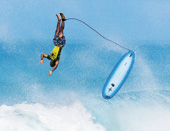 |
| Highs and lows: There is a pressing need for lifeguards and equipment |
As Camus observed, understanding comes cheap after a catastrophe. It took a tragedy for the Goa government and its tourism ministry to understand that though it can make a Cannes out of its pristine beaches, it can’t take consumers for granted. With its 800-km coastline India can become the hub of adventure and water sports, but only if the rights and lives of sports enthusiasts are protected.
Goa’s popular beaches present a great business opportunity for the water sports operators and everyone’s cashing in. As water sports activity increased in Goa over the last five years, even fishing trawlers with no safety equipment aboard began to take unaware tourists for a ride. It was only after a fishing vessel capsized off the Baga coast on April 15, 2003, in a major catastrophe that shocked Goa, that the official machinery began moving its tardy wheels.
Nine tourists from Andhra Pradesh drowned in the Baga incident. A corresponding number of individuals representing their families subsequently filed a petition before the Panjim bench of the Bombay High Court blaming the state authorities for lack of safety arrangements for tourists.
The Panjim bench then directed the Goa government to frame guidelines and classify separate zones for water sports activities. The tourism ministry of the government set up a committee to frame the guidelines and bring the unorganised sector of water sports activities under its purview. Also came into the picture, one of Mumbai’s big water sports operators, Rajeev Somani, managing director of H2O Water Sports Complex. Somani, who runs the H2O complex in partnership with adventure sports enthusiast and film star Suniel Shetty, also operates a similar facility at Fort Aguada in Goa and works as an adventure sports consultant for the Taj Hotels. Somani filed a separate petition before the Panjim bench this year to highlight the need for proper safety norms and discrepancies in the implementation of the existing ones.
| Goa Water Sports Activities Guidelines 2003 |
 |
| • Green Signal: Operators need clearance from the captain of ports, the mercantile marine department and the departments of fisheries or water resources. • Clean Chit: Equipment requires certification from the National Institute of Water Sports or the captain of ports . • Safe Hands: The operators should have crew trained at operating boats and life-saving. • Upper Limit: The capacity of the boat should be mentioned on the number plate. • Safety Cover: The operator should produce proof of insurance of the passengers to the extent of at least Rs 2 lakh. • Area Defined: Board rides, scooter rides, parasailing, water skiing, windsurfing and sailing to be carried out in earmarked areas. |
“We have saved 26 lives in three years at this beachfront. But, how many can I save on the 800-km coastline India has?” asks Somani, whose complex on the Marine Drive promenade in Mumbai has 36 trained life guards and sophisticated equipment which have been instrumental in saving lives on the beachfront.
That’s exactly why Somani intervened in the legal process currently on in Goa. “If the families from Andhra had not approached the courts, probably nobody would have cared about the nine tourists who died. But, due to the judicial intervention, at least some guidelines have been formulated now. But, it is important that safety norms should be implemented properly as well,” says Somani.
Somani’s petition pointed out that the safety norms prescribe that each water sports facility should possess a dedicated rescue boat manned by trained personnel and equipped with life-saving equipment. Somani claimed that a large majority of water sports operators do not have rescue boats.
“There are no jetties for embarkation and disembarkation. Areas should be demarcated where mechanised craft should be allowed to ply at specified speed limits. A monitoring agency should be set up to record any accidents, incidents and non-compliance of safety norms,” he says.
Somani also argues strongly that the government should demarcate one zone for every licensed water sports operator and hold him responsible for the safety and cleanliness of that particular zone. “If you hold the operator accountable for keeping the marine environment clean and providing life-saving equipment, our beachfronts will be both safer and cleaner. We at H2O Mumbai daily clean up the garbage thrown back by the sea. In Goa, it makes sense because tourism is Goa’s chief industry,” Somani says at his Opera House office which gives a breathtaking view of the Marine Drive promenade.
The Panjim bench has disposed off Somani’s petition, but directed him to make his suggestions before the committee appointed by the Goa government.
“The Goa guidelines are likely to set a legal precedent for water sports activities in the rest of the country. The Maharashtra government too can look at them,” says advocate Jamshed Mistry who appeared for Somani.
According to Somani, the absence of safety norms had restricted the growth of water sports in India. ‘The safer you make water sports, the faster they will grow in India.”










